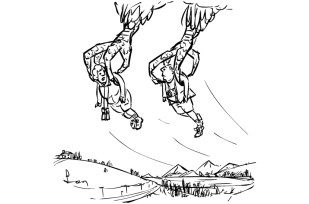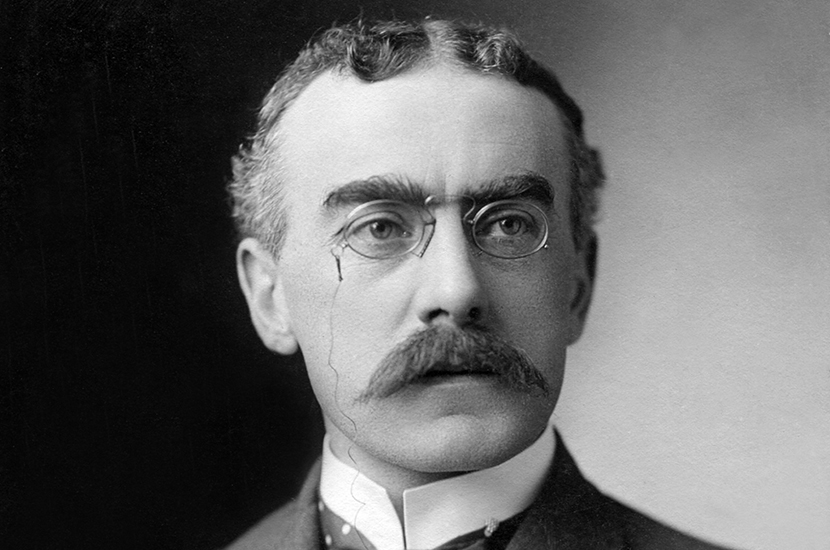Is Boris Johnson a fan of Harry Perry Robinson? If he isn’t, he really ought to be. Reading this absorbing biography, I was struck by how much they have in common — especially in their early lives. Both men went to public school, then on to Oxford, then into journalism, where they proved incapable of writing a dull sentence. They both divorced and remarried — and were also American citizens, for a while. Both dipped a toe into politics, but while Boris took the plunge, Harry stepped back and remained a jobbing hack until his dying day, the finest journalist of his generation. The biggest difference, however, is that Harry was born in 1859, which is why you’ve probably never heard of him. I certainly hadn’t until I read Joseph McAleer’s fascinating book.
Robinson’s journalistic career gave him a ringside seat at some of the most dramatic events of the late 19th and early 20th centuries, from the American Gold Rush of the 1880s to the excavation of Tutankhamun’s tomb. He had the three crucial attributes common to all great reporters: an eye for a good story, the wit and tenacity to research it properly and the ability to write it up in an entertaining way. One of his editors said that his copy read like Dickens. The extracts McAleer reproduces bear this out.
Robinson won his spurs as a reporter in the USA, where he proved hugely successful. By his mid-thirties he was a prolific columnist, editor, novelist and publisher — mainly due to his talent and hard work, but also, in no small part, to his wealthy, well-connected American wife. Then, in 1900, after 17 spectacular years Stateside, culminating in a leading role in winning the presidency for the Republican candidate William McKinley, he returned to Britain. Why? Nobody, including McAleer, seems entirely sure, but it appears to have had something to do with the breakdown of his marriage.

Back in Blighty, he bought a publishing house, but this business didn’t prosper, despite promoting the young, unknown Jack London. He also started an upbeat patriotic journal called VC (‘a paper of the people — a pennyworth of happiness’) but that didn’t last long either. It was the Times which rescued his career, giving him a role as a roving reporter. He remained with the paper for the rest of his life and became one of its star writers.
The first world war was his heyday. He was nearly 60 by the time it ended, but despite being the oldest war correspondent in the field he spent more time at the Front than any other reporter.‘I can give you a special remedy for getting to sleep during the bombardment of a town: play the Dulwich & Sydenham Golf Course,’ he recollected. ‘I only remember playing the first six holes, so I must have fallen asleep.’
He was knighted for his wartime work, and when the Times hatched an exclusive deal to cover Lord Carnarvon’s Tutankhamun expedition, Robinson was the natural choice to represent the paper. His dispatches from Egypt were electric (the result of tireless reporting, not just literary flair) but some of his other journalism hasn’t aged so well. When he travelled to India with the Prince of Wales (the future Edward VIII), he downplayed local protests and dismissed Gandhi’s potent demonstrations as farcical.
Despite being the oldest correspondent in the field, Harry spent more time at the Front than any other reporter
Robinson was an ardent royalist and a passionate supporter of the British Empire. On this occasion (and various others) it seems he let his sympathies cloud his judgment as a reporter. He’d made his name in America as an outsider. Now he’d become part of the establishment he was reporting on, determined to exalt the monarchy and empire, and inclined to view the changing world through this restrictive lens.
If there was one thing he loved as much as king and country, it was America. Throughout his long career, on both sides of the pond, he strove to foster the ‘special relationship’. ‘The Channel still remains a vastly wider gulf than the Atlantic,’ he told his American readers. ‘England is not part of continental Europe.’ Well, that’s a matter of opinion — but it’s one which remains widespread. ‘Might he have welcomed Brexit?’ asks McAleer.
I suspect he would have, but I’m not sure this is such a great endorsement. He was wrong about a lot of things, not least India and Ireland, and by the time he died, in 1930, many of his ideas were out of date. Had he lived a little longer, his hopes for an Anglo-American alliance would have been realised, but he would also have seen his beloved Empire fall apart.
Harry Perry Robinson is not a particularly topical figure. He has nothing especially useful to teach us about the world today. But he was a good writer and a very good reporter, and Joseph McAleer has performed a valuable service in bringing his fine work to the fore.






Comments